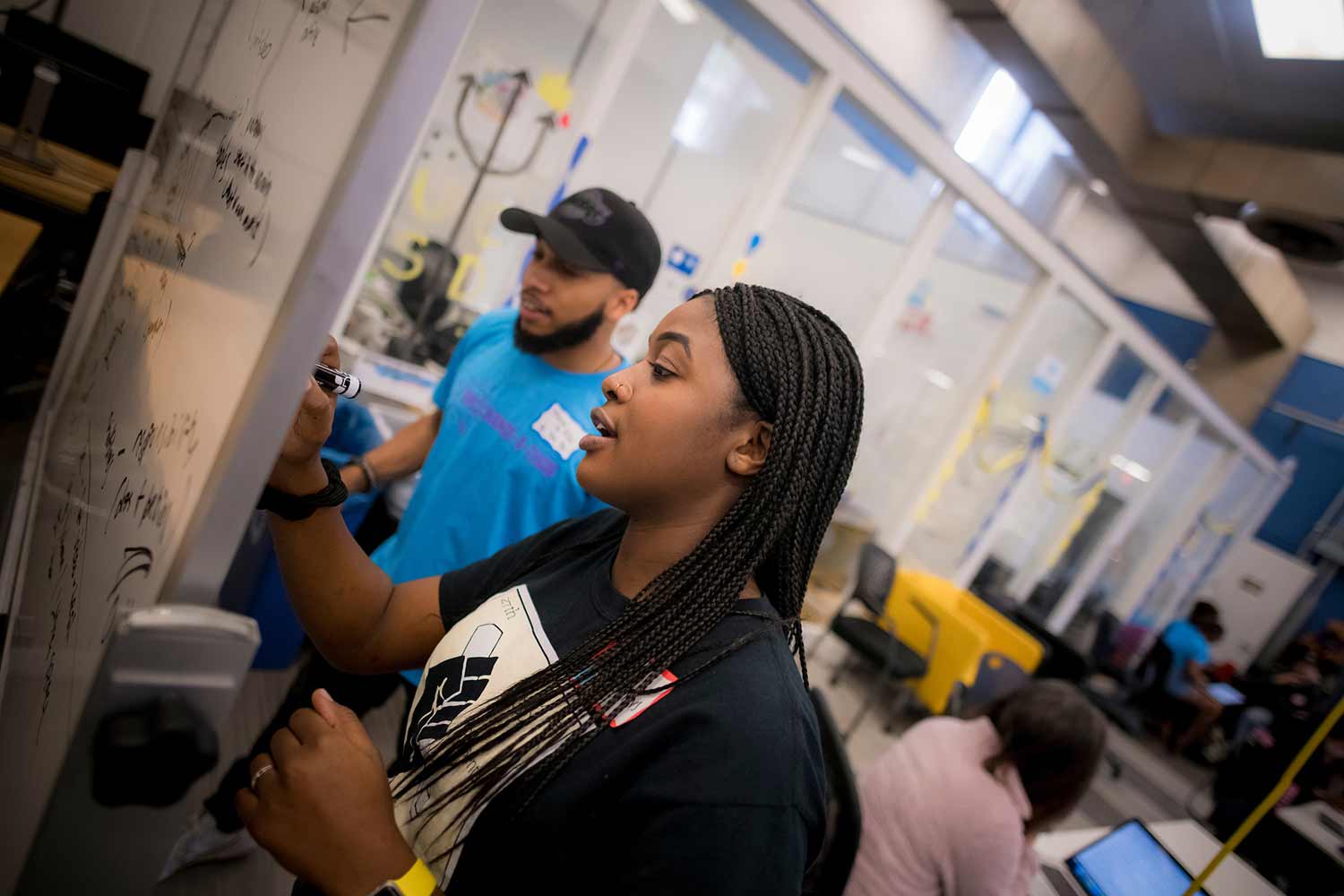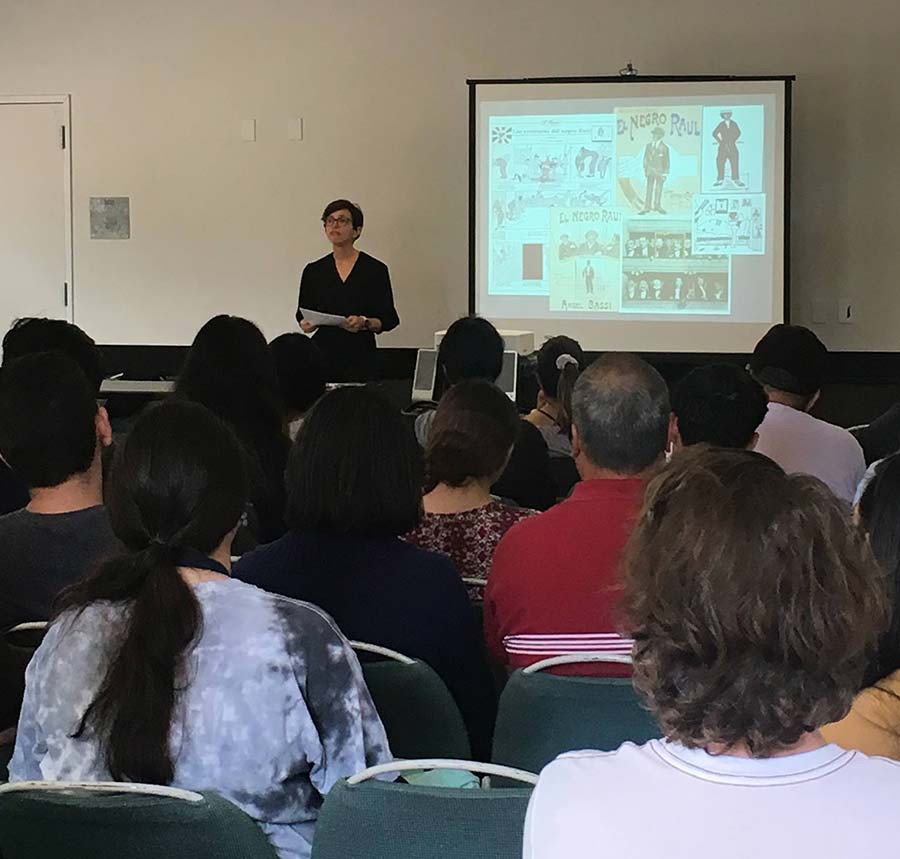By:
Published Date

UC San Diego Commits $2.5M to the Black Studies Project
Project provides faculty and students opportunities to examine, study and contribute to topics that have taken center stage nationally and internationally
This is a crucial time for each and every university to consider the role that Black studies plays in its intellectual and institutional formation, according to the conveners of the Black Studies Project (BSP) at UC San Diego. The current political moment has not only heightened the urgency of grappling with questions of Blackness and anti-Blackness, but has underscored the critical role that Black studies scholars and scholarship must play in this ongoing dialogue. Black studies has never been more relevant.
Highlighting the importance of the Black Studies Project at UC San Diego, a recent commitment by Chancellor Pradeep K. Khosla and Executive Vice Chancellor Elizabeth Simmons increases current support for a greater impact on curriculum, research, programming, institutional structure and campus life. The BSP will receive $500,000 a year for five years, allowing the initiative to expand efforts to support, produce and disseminate scholarship and mentoring focused on racial and social justice across our university and beyond. The Office of the Vice Chancellor for Equity, Diversity and Inclusion was integral in securing the commitment.
“One of UC San Diego’s strategic goals is to cultivate a diverse and inclusive university community that encourages respectful open dialogue, and challenges itself to take bold actions,” said Chancellor Pradeep K. Khosla. “This is one such bold action. This additional financial commitment will amplify the innovative, cross-disciplinary research that the Black Studies Project produces and invite more scholars to advance racial and social justice.”
A focus on African American and Diaspora Studies
Associate Professors Dayo Gore and Sara Clarke Kaplan founded the Black Studies Project at UC San Diego in fall 2012. A cross-divisional group of more than a dozen faculty members from three divisions and nearly 10 schools/departments, along with a select number of interested graduate students and staff, came together to organize a yearlong series of speakers, symposia and workshops entitled “Thinking Race, Gender and Place: A Black Studies Project.”

Amr Haj-Omar, a visiting electrical engineering Ph.D. student from Morgan State University, working in Professor Todd Coleman's lab, presents at a Black Studies Project seminar.
Today, the BSP fosters and supports research, community building and campus programming on African American and Diaspora Studies at UC San Diego and throughout the University of California system. The three focus areas of the project include Intersectional Analysis of Race, Class, Gender, and Sexuality; Transnational and Diasporic Studies; and Social Justice Movements. The project provides students, faculty and staff with opportunities to examine study and contribute to important topics that have taken center stage nationally and internationally.
The Black Studies Project co-founders Gore (currently an associate professor of African American Studies at Georgetown University) and Kaplan felt Black studies was a vital area of growth for UC San Diego. “It has been more than a half-century since African American studies emerged as an institutionalized field within the interdisciplinary humanities,” they argue. “In that time, it has evolved into a vibrant field with a global scope that provides valuable frameworks for understanding relations of power and difference.”
Despite the disproportionately small population of Black-identifying students or faculty members, our university is home to a number of nationally renowned and widely published scholars and teachers of African American and Diasporic literature, history and cultural studies. More than 15 scholars working in Black studies and a number of other faculty engaging the field in their research are affiliated with the project. Their disciplines include anthropology, communication, education studies, engineering, ethnic studies, film, gender and sexuality studies, history, literature, music, public health, and sociology—all reflecting the strong and rigorous interdisciplinary scholarship that has been so foundational to Black studies.
Current movements emphasize the relevance of Black studies

“One of the BSP’s three areas of research is social justice movements, and the Black Lives Matter movement is arguably the most pressing, active and visible social movement of our time,” said Jessica Graham, current director of the Black Studies Project and associate professor of History. “Black Lives Matter began in 2013 after Trayvon Martin’s killer, George Zimmerman, was acquitted of his murder. The BSP has invoked BLM partly to help translate our mission to the campus and public for some time now. (One of the BSP’s mantras has been 'Black Lives/Books/Studies Matters.') Our reference to Black Lives Matter well before 2020 exemplifies the ways in which Black Studies scholarship examines major issues, problems, and dilemmas facing our society before others realize their true importance.
“Through the Office of the Dean of Social Sciences we have been in contact with one of the Black Lives Matters founders and UC San Diego alumna, Alicia Garza, and her Black Futures Lab to explore ways that we may work together,” continued Graham. “We also hope to expand our relationships with other campus partners who are now more invested in research questions related to anti-Blackness and racial injustice. For instance, the Halıcıoğlu Data Science Institute is one of many campus partners that has reached out to us. Finally, as we always do, the BSP seeks to make our programming relevant to current events. As such, we are in talks to host and co-host virtual events that tackle the issues raised by and relevant to BLM, particularly police violence, the prison industrial complex and abolitionism.”
The difference expanded funding will make
Vice Chancellor for Equity, Diversity and Inclusion Becky Petit added, “Our continued commitment to the faculty-run Black Studies Project underscores the impact and significance of this important program at UC San Diego. The program aligns with the UC San Diego Strategic Plan for Inclusive Excellence by helping to create a pro-Black environment on our campus, through advancing scholarly work, facilitating academic success, and helping to foster a sense of belonging for Black undergraduate and graduate students.”
The Black Studies Project organizes a minimum of three public events on campus each year around a common theme. In addition, the initiative provides a variety of faculty and student development opportunities including faculty and graduate student seminars, writing retreats, national research collaboratives, fellowships and travel grants.

Dr. Paulina Alberto at UC San Diego for her talk, “'A Strange Creature of the Night’: Raúl Grigera and the Feat of Black Celebrity in 1910s Buenos Aires".
James Crawford, a fourth-year doctoral student in Education Studies, said BSP’s community-building mission was as an essential component to his sense of belonging at UC San Diego. “As one of three Black Ph.D. students in Education Studies, and being among the 2.5% of Black graduates at UC San Diego, I feel the inherent challenges of graduate school are compounded by the lack of Black peers and mentors that can provide personal and academic support. During my second year at UC San Diego, I began participating in the BSP Graduate Student Seminar. The seminar helped me develop meaningful relationships with a cadre of racially/ethnically diverse interdisciplinary graduate students,” he said.
“During my third year, I became the BSP Graduate Student Researcher (GSR) and in this position, I was able to expand my academic knowledge and networks to connect with prominent Black scholars and researchers through various BSP keynote presentations, brown bag talks, panels, and community events.”
With UC San Diego’s expanded funding commitment, the largest area of growth for the Black Studies Project will be in its multi-tiered fellowships, grants, research internships and mentorships in African American and Black Diaspora Studies at all levels—from faculty members to postdoctoral fellows to graduate students to undergraduates. This will create opportunities for senior, emergent and potential scholars to engage with and mentor each other across academic stages and professional rank.
BSP’s Social Justice Fellowship will also be able to build reciprocal relationships between UC San Diego and cultural producers, public intellectuals and community-builders by bringing together our faculty and students with non-affiliated social justice innovators. Graham explained that, per the BSP founders, this approach reflects Black studies’ historical mission: to conduct research in pursuit of access, equity and justice for Black communities; and to serve as a lever of change within academic institutions where Black people, their experiences, and their forms of knowledge production have traditionally been underrepresented.
“As scholars and teachers, we believe that current and future public conversations about race, power and society must be rooted in the rigorous interdisciplinary study and dissemination of the histories, social formations, political structures and cultural texts of communities of African descent,” said Kaplan, Black Studies Project co-founder and associate professor of Ethnic Studies and Critical Gender Studies at UC San Diego. “Ensuring that this knowledge is readily available for policymakers, changemakers and community stakeholders, however, requires supporting and fostering the new scholars and scholarship emerging in the field of Black studies right now. This is the work that Black Studies Project has undertaken for the last eight years, and that we endeavor to continue through our next stage of institutional growth.”
To learn, more visit the UC San Diego Black Studies Project website.
Share This:
Stay in the Know
Keep up with all the latest from UC San Diego. Subscribe to the newsletter today.



